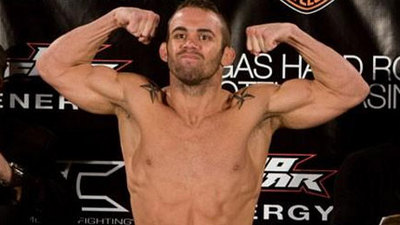
When the WEC finally folded and many of their top fighters made the transition to the UFC Jamie Varner (20-6-1, 2 NC) was not one of them. Varner fought on the promotion’s final card in December 2010 against Shane Roller and lost that bout via submission. It was his third loss that year.
As a former WEC lightweight champion and as someone who had started their career going 16-2, three straight losses (and a draw) did not inspire confidence in onlookers, nor to the UFC brass.
The next year did not start off much better for Varner. For the first time since 2006 he was back on the regional circuit, and he was dropping bouts to TUF cast-offs.
But then something changed.
Varner moved from New Jersey back to his home in Arizona, began working with former coaches and teammates and started winning fights again. Fighting for the XFC in October 2011 Varner scored a first round knockout over veteran Nate Jolly. Varner returned to the XFC four months later to score a first round submission (due to punches) win over UFC veteran Drew Fickett.
Then in May 2012 Varner got the call. UFC 146’s Evan Dunham was injured and they needed a replacement to fight an unbeaten Edson Barboza on short notice. Barboza was riding a 10-fight win streak with seven of his wins coming by knockout. It was an enormous opportunity for Varner to get back among the elite level competition in the sport.
Three minutes and twenty-three seconds into the bout Jamie Varner became the first person to not only defeat Edson Barboza, but stop him via technical knockout. Varner was back and back in a big big way. Like a home run hitter who had been off his game, Varner got his groove back and had just knocked it out the park.
Everybody loves a comeback story. It’s the stuff sports legends are made of. On Tuesday’s episode of Inside the Cage Radio on the Pro MMA Now Radio Network, Varner explained what had been holding him back.
“The biggest obstacle was probably overcoming some of those mental blocks that I had, and just getting over that hump,” he said. “Every great athlete has had a slump at one point in time or another and I was really burnt out going into that 2010 year; just been fighting so long, so many training camps and then having the fans kind of turn on me a little bit. It all kind of piled on top of each other to really make it hard for me to get motivated and made me lose the love for the sport. So I think getting past that mental block was probably the biggest challenge I had to overcome.”
Varner talked about his mindset going into the fight with Barboza. “The thing is just I put so much pressure on myself to perform well, put so much pressure on myself to win, so I was fighting not to lose and when you fight like that you hold back, and you have too much fear in your heart,” Varner said. “And I think going into that Barboza fight I just didn’t put any pressure on myself to win. The only thing I told myself is I’m going to go out there and give this guy 15 minutes of hell, and may the better man win.”
“If he walks away with his hand raised then he deserves it. If he walks away with his hand raised, then you know what, he deserves it. I just want to go out there and lay it all on the line and fight my heart out. And I’m not putting the pressure on myself to win. I’m not putting the pressure on myself to have fight of the night type performance. I’m just going out there to give it my all, fight with my heart, every ounce of my being, and I think when you do that the best things are sure to come.”
“And I think just fighting without that pressure, fighting without that fear, is what kind of made the difference in the Barbosa fight and I think that’s kind of what has turned my career around; not having all that pressure on myself to win, but just to go out there and fight, fight because I love it. Not fight because I have to but fight because I want to.”
Now that Varner is back on track and has this new-found mental approach, how does he keep it? Once a fighter starts racking up those wins again, and with so much on the line, how does one keep from slipping into that mode of “fighting not to lose”?
Varner explained, “Every athlete, every competitor wants to win. And so I do catch myself putting a lot of pressure on myself to really have good workouts, to have good sparring sessions and to try and win every second of every round in my sparring. I find it to be mentally draining and mentally taxing. And I catch myself, you know what, relax, have fun, just focus on a couple things when you’re in that five minute sparring round. Work on those things, then the next round, come back regroup and just try to focus on winning each moment. If I get put in a bad position, to win that moment, to get out of that bad position. Just try to find little ways to win inside the moment, inside the round. … I guess you could say, I do catch myself wanting to win, but I’m more focused on performing well.”
Varner returns to the Octagon on Aug. 4 when he opens up the FOX-televised main card against fellow lightweight Joe Lauzon at “UFC on FOX 4”. You can follow Jamie on Twitter at @JamieVarner. Listen to Inside the Cage Radio each Tuesday and Thursday on the Pro MMA Now Radio Network.

[…] […]